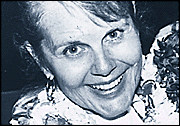

![]()
View Point


![]()
View Point
One new local angle which is shaping public consciousness of the tragic events in the Balkans is the daily tracking of Hawaii contributions to the International Red Cross, along with names and gift amounts. Could Hawaii
become a Kosovo?The ethnic cleansing of an entire people is a humanitarian trauma of immense global concern -- a fact not lost on Hawaii residents. And while I question the "lottery/holiday gift fund" cataloguing of funds, I wonder if Hawaii citizens are responding to the Kosovo refugee situation, since the ethnic contradictions hit close to home.
Given our multiracial population, a colonial history which has greatly displaced indigenous Hawaiians, issues of land use and tenure, and our ongoing experiment in culture-sharing, mixing and transformation, the specter of ethnic cleansing ought to teach us something about tolerance. And claims of justice.
A senior citizen friend of mine, now 10 years living in Hawaii, recently told me of her terrifying nightmare. Like Serbian paramilitary troops, black-hooded Hawaiians, she recounted, were going door-to-door in the islands throwing out all the "others" whose ancestors had stolen their land. "They would be justified, too," she admitted. "For all that has been taken from them."
This is an extreme but not unrealistic projection, if one bases the idea of justice on a model of tribal vengeance and historical score-settling: the Milosevic "justice."
The CNN refugee images are anguishing. They numb us. They begin to blur into emotional gauze: We see the outlines of the wounds without actually being touched by them. But, as in my friend's dream, try thinking about it happening in Hawaii.
Try evoking our own potential holocaust of ethnic hatreds. Remember, these tactics have been used throughout most of European history: war, partition, forced assimilation, ethnic cleansing. Can we see the roots of this bloody potential in our Hawaii past? Could we envision a similar Kosovo future? Is this why so many of us feel empathy for the Kosovars?
My friend's nightmare was just that, a nightmare. Native Hawaiians are not haters, murderers and barbarians.
Hawaiians are using their minds, energies and spiritual strength to reinvent themselves and reclaim their land and sovereignty. Yes, some voices are strident; some actions militant. But their revolution and their justice are not that of Milosevic.
They are creating a "velvet revolution," not black hoods and blood. In this strategy Hawaiians demonstrate a political wisdom seldom afforded them by those who have come to share, and most often dominate, their aina.
Maybe Hawaiians themselves (no false homogeneity should be assumed) are suggesting a new conversation to talk about ethnic co-existence, local style. We have reason to hope it is a democratic conversation.
We have reason to hope it is informed by charity and analysis. The generosity of the Red Cross phenomenon of giving is reflected in names like Lau, Jones, Kalama, Medeiros, Park, Matsumoto and Tauofa.
At a recent conference looking at how the Waikiki tourist industry degrades Hawaiian culture, Don Ho admonished participants that tourists aren't "a different species."
"Don't get like Kosovo," Ho warned. That would truly be our collective nightmare.
Nancie Caraway is a playwright, political scientist and activist.